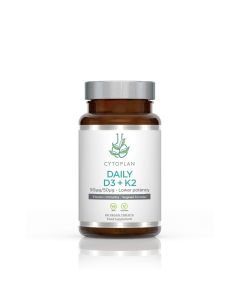In modern society there are many factors that can negatively impact upon achieving a refreshing night's sleep, making sleep problems widespread. Shift work, chronic stress, stimulants and impaired blood sugar regulation are just a few. In many cases there is a nutrition gap between the nutrients that are being ingested and those needed by individuals for quality sleep.
Quality sleep is essential to our physical, mental and emotional wellbeing. Conversely, inadequate sleep can have a serious and detrimental effect on our health. In the short term, we may be hungrier and tired the next day and find it difficult to concentrate; this can also affect our food choices as it can lead to poor decision making. In the longer-term, inadequate sleep can contribute to cognitive decline, a weakened immune system, poor nutritional status, and many chronic diseases.
The major factor involved in sleep initiation is the neurotransmitter melatonin, which is known as the "sleep hormone". Melatonin is produced from serotonin, which is stimulated by daylight. When in darkness, the pineal gland detects the lack of light and initiates the conversion of serotonin to melatonin. Many nutrients are required for this conversion, including magnesium and vitamin B6.
Cortisol, our stress hormone, is responsible for our sleep-wake cycle and works in opposition to melatonin, therefore helping us to feel awake. Stress can also deplete many nutrients such as magnesium, which can support sleep and relaxation. When we are stressed, our cortisol levels increase and can make us feel wide awake, so even if we are tired, high cortisol levels can inhibit our ability to fall asleep. Poor sleep is a stressor on the body, so in turn increases cortisol production, creating a viscous cycle.?In modern society, our stressors can come in many forms such as financial worries, relationship problems, health concerns and busy schedules. Other less obvious scenarios which our bodies may perceive as stress include pain, over-exercise, nutrient deficiencies, blood sugar imbalances, stimulants, as well as our thoughts and perceptions.?
Here at Cytoplan we offer a comprehensive range of safe, gentle and effective supplements to support sleep and aid relaxation. Our sleep supplement range comprises products that support the manufacture of important neurotransmitters that are necessary for sleep. We also provide our best natural sleep aid, Cyto-Night, which has been expertly formulated to contain key sleep supportive ingredients such as Montmorency cherry, which is a natural source of melatonin.
Further to our range we have a variety of magnesium supplements to help you sleep including Magnesium Bisglycinate, which is particularly indicated in sleep and relaxation, amino acids which support GABA production (the calming brain neurotransmitter) and calming adaptogenic herbs.
All our sleep support supplements are suitable for vegetarians and vegans.
What are some natural sleep remedies?
The most effective way to improve sleep quality is by identifying and addressing factors that may be impairing sleep.
- Managing stress levels - to counteract stress, try relaxation promoting activities such as yoga, meditation, mindfulness, breathing and massage. Taking a warm/hot Epsom salt bath before bed to aid sleep and relaxation can be beneficial.
- Ensure daytime full light exposure as well as activity. The light/dark cycle of the sun has a powerful effect on our circadian clock and sleep.
- Keep the room cool. Most people sleep best at around 18 degrees Celcius with adequate ventilation.
- Avoid work or watching television in bed - blue light emitted from devices such as phones, tablets, televisions and computer screens inhibit the production of melatonin.
- It is important to sleep in complete darkness at night as this will boost your melatonin secretion, which will help you go into a deeper, more restful sleep.
- Try cutting down on stimulants such as caffeine and alcohol. Ideally no caffeine after midday - some people take 12 hours to metabolise caffeine.
- Create a regular sleeping and waking schedule so that you support your body's natural rhythms.
- Create a relaxing bedtime ritual.
- Aim to keep blood sugar levels stable - poor blood sugar control can cause night wakening.
Are magnesium supplements good for sleep?
What are the best supplements for sleep?
L-theanine - is an amino acid which supports GABA production and has been shown to have calming properties. GABA (the calming brain neurotransmitter) is associated with slower brain waves, which are consistent with sleep. L-theanine can be taken in the day due to its lack of sedation.
5HTP - is the precursor to serotonin, converted in the presence of magnesium and B6.It can be useful for initiating sleep, particularly if melatonin or serotonin levels are low. Our 5-HTP plus product contains these key nutrients.
Magnesium - aids muscle and nerve relaxation and is a cofactor for the enzyme which produces serotonin (which is then converted to melatonin). Our Magnesium Bisglycinate, is a highly absorbable form of magnesium, bound to the amino acid glycine and is particularly indicated in sleep and relaxation.
Cyto-Night - Montmorency cherry is a natural source of melatonin, the neurotransmitter responsible for the induction of sleep. Melatonin contributes to the reduction of time taken to fall asleep. Our Cyto-Night contains other key ingredients such as magnesium, hops and glycine.
Organic Ashwagandha - is a calming adaptogenic herb.







